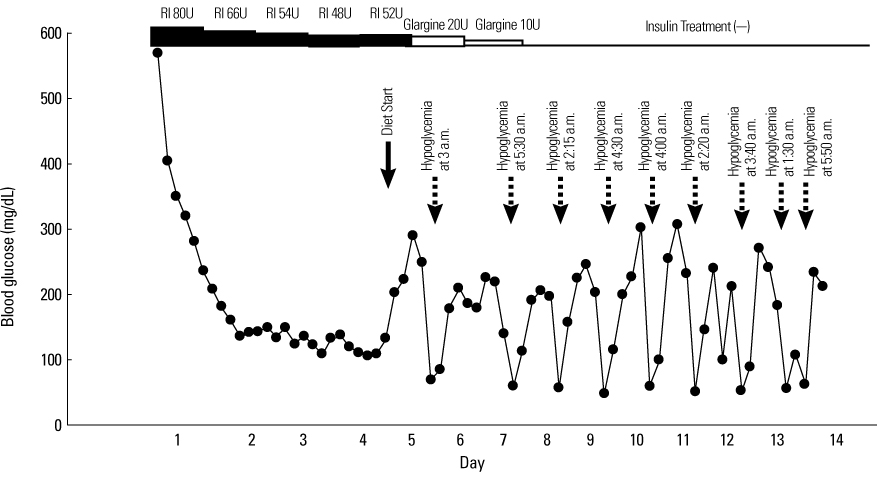Endocrinol Metab.
2010 Sep;25(3):217-220. 10.3803/EnM.2010.25.3.217.
Spontaneous Hypoglycemia due to Insulin Antibody after Insulin Treatment of Diabetic Ketoacidosis
- Affiliations
-
- 1Department of Internal Medicine, Chonnam National University Medical School, Gwangju, Korea. mychung@chonnam.ac.kr
- KMID: 2169060
- DOI: http://doi.org/10.3803/EnM.2010.25.3.217
Abstract
- Hypoglycemia in diabetic patients is usually caused by excessive exogenous insulin or the administration of an insulin secretagogue relative to the prevailing glucose concentration. Thus, the clinical manifestations of hypoglycemia are usually not observed in diabetic patients after either insulin or an oral hypoglycemic agent is discontinued. In contrast, diabetic ketoacidosis results from relative or absolute insulin deficiency. Although about 40% of diabetic patients who inject human insulin have insulin antibodies, these antibodies seldom significantly affect the glycemic control. It has not been reported in the literature that insulin antibody in the setting of human insulin therapy is associated with diabetic ketoacidosis and subsequent hypoglycemia. We describe here a rare case of spontaneous hypoglycemia due to insulin antibody after the improvement of diabetic ketoacidosis in a patient with type 2 diabetes mellitus and who had been treated with human insulin.
Keyword
MeSH Terms
Figure
Cited by 1 articles
-
Insulin Autoimmune Syndrome with Diabetic Ketoacidosis
Yeong Geol Jo, Young Il Kim, Su Jin Lee, Ki Won Kim, Sung Wan Chun, Yeo Joo Kim, Sang Jin Kim
J Korean Diabetes. 2012;13(2):105-109. doi: 10.4093/jkd.2012.13.2.105.
Reference
-
1. Van Haeften TW. Clinical significance of insulin antibodies in insulin-treated diabetic patients. Diabetes Care. 1989. 12:641–648.2. Wredling R, Lins PE, Adamson U. Prevalence of anti-insulin antibodies and its relation to severe hypoglycaemia in insulin-treated diabetic patients. Scand J Clin Lab Invest. 1990. 50:551–557.3. Eledrisi MS, Alshanti MS, Shah MF, Brolosy B, Jaha N. Overview of the diagnosis and management of diabetic ketoacidosis. Am J Med Sci. 2006. 331:243–251.4. Heller SR. Hypoglycaemia in Type 2 diabetes. Diabetes Res Clin Pract. 2008. 82:S108–S111.5. Berson SA, Yalow RS, Bauman A, Rothschild MA, Newerly K. Insulin-I131 metabolism in human subjects: demonstration of insulin binding globulin in the circulation of insulin treated subjects. J Clin Invest. 1956. 35:170–190.6. Guermonprez P, Valladeau J, Zitvogel L, Théry C, Amigorena S. Antigen presentation and T cell stimulation by dendritic cells. Annu Rev Immunol. 2002. 20:621–667.7. Fineberg SE, Huang J, Brunelle R, Gulliya KS, Anderson JH Jr. Effect of long-term exposure to insulin lispro on the induction of antibody response in patients with type 1 or type 2 diabetes. Diabetes Care. 2003. 26:89–96.8. Raskin P, Guthrie RA, Leiter L, Riis A, Jovanovic L. Use of insulin aspart, a fast-acting insulin analog, as the mealtime insulin in the management of patients with type 1 diabetes. Diabetes Care. 2000. 23:583–588.9. Pieber TR, Eugène-Jolchine I, Derobert E. Efficacy and safety of HOE 901 versus NPH insulin in patients with type 1 diabetes. The European Study Group of HOE 901 in type 1 diabetes. Diabetes Care. 2000. 23:157–162.10. Davis SN, Thompson CJ, Peak M, Brown MD, Alberti KG. Effects of human insulin on insulin binding antibody production in nondiabetic subjects. Diabetes Care. 1992. 15:124–126.11. Karjalainen J, Knip M, Mustonen A, Akerblom HK. Insulin autoantibodies at the clinical manifestation of type 1 (insulin-dependent) diabetes--a poor predictor of clinical course and antibody response to exogenous insulin. Diabetologia. 1988. 31:129–133.12. Peters A, Klose O, Hefty R, Keck F, Kerner W. The influence of insulin antibodies on the pharmacokinetics of NPH insulin in patients with type 1 diabetes treated with human insulin. Diabet Med. 1995. 12:925–930.13. Kim MR, Sheeler LR, Mansharamani N, Haug MT, Faiman C, Gupta MK. Insulin antibodies and hypoglycemia in diabetic patients. Can a quantitative analysis of antibody binding predict the risk of hypoglycemia? Endocrine. 1997. 6:285–291.14. Redmon B, Pyzdrowski KL, Elson MK, Kay NE, Dalmasso AP, Nuttall FQ. Hypoglycemia due to an insulin-binding monoclonal antibody in multiple myeloma. N Engl J Med. 1992. 326:994–998.15. Eguchi Y, Uchigata Y, Yao K, Yokoyama H, Hirata Y, Omori Y. Longitudinal changes of serum insulin concentration and insulin antibody features in persistent insulin autoimmune syndrome (Hirata's disease). Autoimmunity. 1994. 19:279–284.16. Van Haeften TW, Bolli GB, Dimitriadis GD, Gottesman IS, Horwitz DL, Gerich JE. Effect of insulin antibodies and their kinetic characteristics on plasma free insulin dynamics in patients with diabetes mellitus. Metabolism. 1986. 35:649–656.17. Suzuki K, Hirayama S, Ito S. A case of a non-insulin dependent diabetic patient with regular spontaneous hypoglycemic attacks, which were due to insulin-binding antibodies induced by human insulin therapy. Tohoku J Exp Med. 1997. 182:163–173.18. Koyama R, Nakanishi K, Kato M, Yamashita S, Kuwahara H, Katori H. Hypoglycemia and hyperglycemia due to insulin antibodies against therapeutic human insulin: treatment with double filtration plasmapheresis and prednisolone. Am J Med Sci. 2005. 329:259–264.19. Grunfeld C. Insulin resistance: pathophysiology, diagnosis, and therapeutic implications. Spec Top Endocrinol Metab. 1984. 6:193–240.


